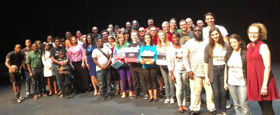Review: An Eclectic Blend of 18 Original Works at the TBTF 2018 Short Play Competition

A reviewer's life is never easy, but it can be quite rewarding. We take notes, and strive for honesty without hurting anybody, but we must call out the bad just as we should elevate the good. And when it comes to a short play competition, we usually get the good, the bad, and yes, sometimes the very ugly. That's what I emerged with at the 5th Annual Tampa Bay Theatre Festival Short Play Competition on September 2nd. Separated by Session One and Session Two, it's a fast three-hour-plus ride, and I was happy to see so many people in the audience (Session Two looked sold out).
Session One started off a bit rough, and then found its groove with the strongest pieces being the last three of the set....
AT THE LIGHT POST. Written by Owen Robertson. Session One started with this comedy, where two drunks get into a heated argument when one finds out that the other dons girly pink underwear. It's funny at times, and John Chaplin gives a brave performance, but there's something unsettling about the gay slurs unapologetically bandied about. I'm sure that this is how these two men would talk and deal with the issue, but it plays quite old-fashioned, like it could have been written 50 years ago. Although often entertaining, it offered nothing new.
THE FEAR OF HEIGHTS. Written by Jonathan Austin. The playwright needs to understand that sometimes what is not said is more important than actual dialogue. This play was confusing at times, with three separate vignettes about people striving against all odds--a girl who wants to be America's Next Top Model; another girl wants to be the President of the United States; and a man who wants to win the lottery. It's a lot for a 10 minute play, and when the actors left the stage, the unnecessary long pauses were scene-killers. It would have been much stronger if all the actors were onstage at the same time, and when one set of them performed, then the others would stay frozen. As it was, the short piece was an interesting idea (with an interesting double-meaning title) that was killed by the lengthy pauses and the frequent empty stage.
BEATING THE ODDS. Written by Nicole Maahs. Two very different students struggle with college life. Amanda Milanetti, with her furry puppy dog slippers, steals the show as a stressed-out student battling her cellphone addicted roommate, but it seems humdrum rather than incisive. In it, we got diatribes instead of dialogue; it probably read better than it played.
DOCTOR DOCTOR. Written Joan Antonicelli. This one was a lot of fun with three people recounting to the audience their first encounter with their plastic surgeon, Dr. Sameer. One needed a face lift; one some nose work; and the third wanted a boob job. It came across as three intertwining monologues, but the actors made it work. Timing is essential, and it was quite a hoot to watch. Still, it could probably have used a more creative title.
DRY SPELL. Written by Gretchen Suarez-Pena. David and Sarah are a young couple who have lost a son and who have lost interest in each other. It's an interesting play, even though the drought and the oncoming rain are handled in a ham-fisted manner (it's way too obvious that the drought and the rain symbolize their relationship). Sarah, well-played by Suarez-Pena, is the more interesting of the two characters, and the dialogue is quite realistic. But at one point, the actress crossed the stage and made sure she didn't turn her back to the audience; this looked unnatural in an otherwise fine performance. (In a realistic scene in an intimate theatre, please turn your back at times if you want and if it fits the scene, as it does here; make it natural, realistic, not theatrical.) I wish the actor playing the husband used opposites when dealing with his more aggressive wife; it would make the scene more interesting instead of a constant scream-fest. Also, the child backstory shouldn't be spelled out so overtly; mystery sometimes works wonders. But it had merit and with some rewrites could be quite powerful.
FATHERLESS CHILD. Written by Tony Stinyard. This was one of the two strongest pieces of the day. When it was done, so many people in the audience were wiping their tears away. "Anybody got a tissue?" one lady asked after it was over. Powerful stuff. An adult son meets his father for the first time and is not happy about it. Jay Washington was outstanding as the father, tears streaming down his face as he reaches out for his son (an equally strong Lee Worrell). Although the playing of "Say Something" in the background seemed to unnecessarily pile it on a bit thick (the acting was powerful enough that we didn't need it), the performances and the overall scene, utilizing the key to silences, worked wonders. Redemption is my favorite theme, and this one played straight into my bleeding heart.
FWUFFELS. Written by Jim Moss. A father can't communicate with his departing, distant daughter and must resort to using a childhood stuffed bear named Fwuffels to get through to her. Good performances (by Darrell Huling and Kiana Kehl), a well-written script and expert direction (by David O'Hara) helped propel this to become one of the best of the short-scene lot.
LEGOS FOR TIM. Written by Marc S. Sanders. This one caught me off-guard. I thought it was going in one direction, and then it threw me for a loop. At first I thought the mother in the ripped coat (wonderfully played by Autumn Pandolfo) was talking with a therapist. But at the end, when the truth was discovered, it turned into a horror show; it wasn't a therapist, it was a police officer. And the mother had done something unspeakably horrible. Written in the wake of Sandy Hook, this ended Session One on a bizarre, chilling note. Sanders' dialogue has a nice conversational tone about it, and he rightly waited until the end to pull the rug out from under us.
Session Two started with sadness, then begat lots of laughter, and ended with some of the more confusing short pieces.
THE FIVE STAGES OF GRIEF. Written by T.J. Bostock. Lou is brain dead after a massive heart attack, and his loved ones struggle over losing him. It's a powerfully dramatic work with intense performances that needs more levels. It began at 10 and kept going with no emotional relief. But it certainly started Session Two off with an emotional bang.
IN FARCE. Written by Steven Bucko. This is one of the cleverest short plays in recent memory, where people live in a town called Farce. Self-referential with characters like Miss Plot Device, this one had the audience in stitches. Good sound effects, though the actors' pantomiming skills could use a tune-up. The judges eventually voted IN FARCE the best of the short play competition, and I agree with that selection 100%.
PARENTS IN TRAINING. Written by Marc S. Sanders. Couples attend a birthing class led by a "Nazi nanny." Proof that Sanders is quite a versatile playwright--he penned this laugh-out-loud comedy and Session One's dour LEGOS BY TIMMY. Comic gold. Nicely directed by Angel Borths with hilarious work by Mary F. Jordan, Kelly Clow, Dawn Kidle, Darven Ratte, Michael McKinney, Taliana Bosio and John Hooper. Yes, a decapitated baby doll head pops out of a woman's breast, and this has to be seen to be believed.
RED SAILS AT TWILIGHT. By Jim Moss. Friends and family watch the last sail of a dying man. A more thoughtful piece, with a twist. Led by Richard Coppinger and his incredible booming voice, it's an odd, well-written piece.
RICOCHET. Written by Maria Mendez. By DTC. A guy with a paper bag over his head is held at gunpoint. It's strong and edgy, but way too obvious and one level for its own good. Rants and diatribes litter the piece rather than dialogue and meaning. I like that young people were involved with the creation of this work, but it used violence for the sake of violence without telling us anything new (imagine Reservoir Dogs without the clever dialogue).
THE BRUNCH CLUB. Written by Deborah Bostock-Kelley. This updating of the classic 1985 John Hughes movie, The Breakfast Club, is about as much fun as listening to the greatest hits of A Flock of Seagulls. All of the main characters from the movie, 34 years later, meet (and there's even a photograph of the late Vice Principal Vernon). The iconic teens are updated for the Trump Era; it's also like a cartoon version of another 80's movie--The Big Chill. I like how Brainiac Brian is richer than rich and a Time magazine Man of the Year. And Claire winds up in failed relationships with the jock, Andrew, and the criminal, Bender (and, yes, even has a budding relationship with weird Allison; she gets around). A great idea that comes across more like an SNL skit. It's a blast of retro fun, but if you don't know The Breakfast Club (and shame on you if you don't), then you're probably going to be lost.
THE ROPES. Written by Gabriel Flores. This is a crazy one, a day in the life of a shoe store from hell. Too many unnecessary characters roll on and off stage throughout it, but the audience lapped it up. Some terrific lines ("She's a nine from the ankles up") highlight this frantic work. And for the record, I hate the word "moisture" too.
TOO FAR. Written by India Davison. A father and daughter try to connect, culminating in a moment of sudden physical abuse and the hope for reconciliation. Good performances, although there didn't seem to be any real blocking in it. In the end, I wish the father would have run to the daughter, instead of the other way around, since it is his redemption (a man who doesn't want to become like his own abusive father). With the daughter mending it all so suddenly, it felt rushed, not real.
BROKEN PIECES. Written by Sameya Porter. This one was all over the place, with so many characters, seemingly random flashbacks without ending, characters disappearing for no reason. It felt unfinished, like an accidental Antonioni film. With too much going on, it proves that a powerful message isn't quite the same thing as a powerful play.
TIME TO GET A NEW CAR. Written by Erica King. The last work is also the most surreal. Part Improv team work, part head-spinning pun-fest, with incredible lines and high energy. I laughed a lot, but I didn't feel that the audience quite got it. It reminded me of "Philip Glass Buys a Loaf of Bread," only far more frenetic. Director Ryan Bernier keeps the voltage high in a play that is off the wall in all the right ways.
The Tampa Bay Theatre Festival is once again a whopping success. Led by Rory Lawrence and his wife, Kahlila, it gets better and better each year. I hear wonderful things about the original full-length plays, but judging from the short plays, this year was stronger than last year's. Which means only one thing...mark your calendars for Labor Day weekend, 2019. I can't wait to see what they have in store for us at next year's festival!
Videos
